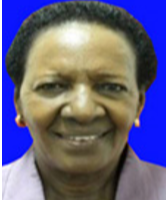
Margaret Simwanza SITTA
YEAR OF MATRICULATION: 1985
EDUCATION:
Margaret Simwanza Sitta [née Simwanza] was born on 24 July 1946 in Urambo district in Tabora. She had her primary education at Tabora Town Primary School from 1954 to 1957; her middle school education at Ussoke Girls Middle School from 1958 to 1961, from where she proceeded to secondary education at Tabora Girls Secondary School from 1962 to 1965. In 1966 she went to Mpwapwa Teacher Training College for a two-year teacher training course which she completed in 1967 with a Certificate award for Teacher Grade “A”. It was from the same college that she obtained her diploma in education eight years later, in 1985. For the next twelve years (1968-1980), she taught in a number of secondary schools in the country, including at Tabora Girls, Azania, Mwanza and Forodhani. After 1980, Margaret was appointed to administrative positions of District Education Officer, first in Urambo in Tabora, then in Moshi, Kilimanjaro, and finally in Kinondoni Municipality in Dar es Salaam in 1995.
For a period of three years, between 1985 and 1988, she had taken an administrative break in order to undertake a three-year undergraduate programme at the University of Dar es Salaam. She obtained a Bachelor of Arts degree with Education in 1988. In 1996, Mrs Margaret Sitta took a rather sharp turn from the normal career line within the education profession, when she was requested and ‘hired’ by the Trade Union Congress of Tanzania (TUCTA) to lead and mentor its department of Workers Education in Dar es Salaam. This automatically made her TUCTA’s spokesperson on issues concerning the teaching profession and teachers in the country. She worked in this position for four years from 1996 to 2000. In this strictly non-governmental position, Mrs. Sitta was highly trusted by TUCTA in terms of her skill in thinking and planning as well as her power of negotiations with contending parties. Understandably, this did not always lead to amicable positions between employees (the majority of the teachers she was leading) on the one hand and employer (government) on the other. Initially—and hypothetically—it must have been difficult for Mrs Sitta as a professional teacher and long-serving teacher employee in government service. But her position and appointment in the workers education department, subsequently as President of a newly formed Tanzania Teachers Union had been a blessing in disguise for the teachers and workers in general.
It was upon her return in 2000 to her ‘home’ Ministry of Education and Vocational Training as a senior officer in the office of the Commissioner of Education that she was appointed Minister in the same Ministry of Education and Vocational Training from 2006 to 2008 (after nomination to Urambo constituency in the 2005 general elections). That moment became a blessing in disguise because, out of no-one’s normal expectations, the same ‘worker leader-sympathiser’ was placed within the structure of the same old lukewarm worker employer. Much of the bickering with teachers in connection with denied or delayed rights was reduced to some understandable minimum, at least partly in trust of their ‘fellow teacher’. Indeed, Margaret Sitta tried to work on teachers’ grievances?regarding delayed teacher promotions, delayed pay and salary arrears, unassisted duty transfers, while she, on her part, fully urged honesty, hard work and professionalism among the country’s teaching force.
She may not have solved all their woes?and no-one would be fair to expect her to solve all the age-old and cumulative problems in a brief though angelic period of her appointment there! But, in all candour, she tried her best. It may also be noted that she was thereafter appointed Minister for Community Development, Gender and Children (2008-2010), a ministry that, in its own way, had a variety of issues concerning the upbringing, safety and education for children and the wider community. Mrs. Margaret Sitta is currently MP [Member of Parliament] for Urambo (Tabora) since 2015. Being a professional teacher herself keeps her political life dedicated, among other things, to concerns regarding quality schools for quality education, teacher professionalism for future educational outcomes in society, and worker satisfaction for worker productivity and honesty. The University of Dar es Salaam is certainly proud of her principles and achievement.

